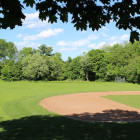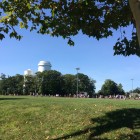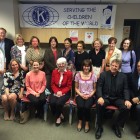Board of Selectmen
‘I Just Don’t Understand the Inconsistency’: Selectman Corbet Questions Continued Use of Pesticides on New Canaan’s Athletic Fields
|
Selectman Kathleen Corbet this week questioned why New Canaan uses pesticides on some of its athletic fields, including those that serve young children who attend public schools where the chemicals are banned. The Parks Department has moved completely away from pesticides on New Canaan Public Schools grounds, so it doesn’t make sense to use the chemicals, even in a single midsummer application, at Waveny, Conner Field and Mead Park playing fields, Corbet said during Tuesday’s regular meeting of the Board of Selectmen.
“I just don’t understand the inconsistency,” she said during the meeting, held via videoconference. “The question is: If we don’t put it on student grounds, why do we put it on the other grounds where obviously the same aged children re playing on those grounds as well? I don’t understand why we don’t have a consistent application of pesticide-free fields.”
The comments came as the selectmen about $140,000 in contracts for the purchase and application of grass treatment products on athletic fields at New Canaan schools and parks. Parks Superintendent John Howe said it’s more cost-effective to maintain the fields with pesticides, as opposed to additional grass seeding, and that the fields themselves are better condition with the pesticide use.




